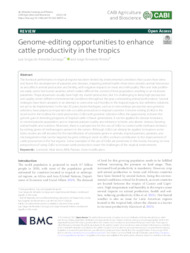Genome-editing opportunities to enhance cattle productivity in the tropics.
Genome-editing opportunities to enhance cattle productivity in the tropics.
Author(s): CAMARGO, L. S. de A.; PEREIRA, J. F.
Summary: The livestock performance in tropical regions has been limited by environmental conditions that causes heat stress and favors the development of parasites and diseases, impairing animal health. Heat stress disturbs animal homeostasis and afects animal production and fertility, with negative impacts on meat and milk quality. Flies and ticks proliferate easily under hot-humid weather, which makes difcult the control of their population, resulting in an increased parasitism. Tropical pastures usually have high dry matter production, but it is challenging to keep high production and quality under diferent environmental conditions throughout the year, constraining animal performance. Several strategies have been adopted in an attempt to overcome such hurdles in the tropical regions, but defnitive solutions are yet to be implemented. In the last 20 years, biotechnologies, such as in vitro embryo production and genomic selection, have played an important role on cattle production in tropical countries. Genome editing (GnEd) is the novel tool in the toolbox for cattle production. GnEd with genomic selection ofers the opportunity to boost the genetic gain in breeding programs of tropical cattle in fewer generations. It can be applied for disease resistance, to control parasite population, and to improve pasture quality and tolerance to biotic and abiotic stresses, favoring animal health and nutrition. Moreover, there is a perspective for the use of GnEd to control cattle methane emission by editing genes of methanogens present in the rumen. Although GnEd can already be applied to improve some traits, studies are still required for the identifcation of candidate genes in animals, tropical pastures, parasites, and microorganisms that can be targeted by gene editing in order to ofer a robust contribution to the improvement of cattle production in the hot regions. Some examples of the use of GnEd are presented in this review, focusing on new perspectives of using GnEd to increase cattle production under the challenges of the tropical environments.
Publication year: 2022
Types of publication: Journal article
Unit: Embrapa Dairy Cattle
Keywords: Estresse térmico, Gado Leiteiro, Leite, Modificação genética, Pastagem, Pecuária
Observation
Some of Embrapa's publications are published as ePub files. To read them, use or download one of the following free software options to your computer or mobile device. Android: Google Play Books; IOS: iBooks; Windows and Linux: Calibre.
Access other publications
Access the Agricultural Research Database (BDPA) to consult Embrapa's full library collection and records.
Visit Embrapa Bookstore to purchase books and other publications sold by Embrapa.

